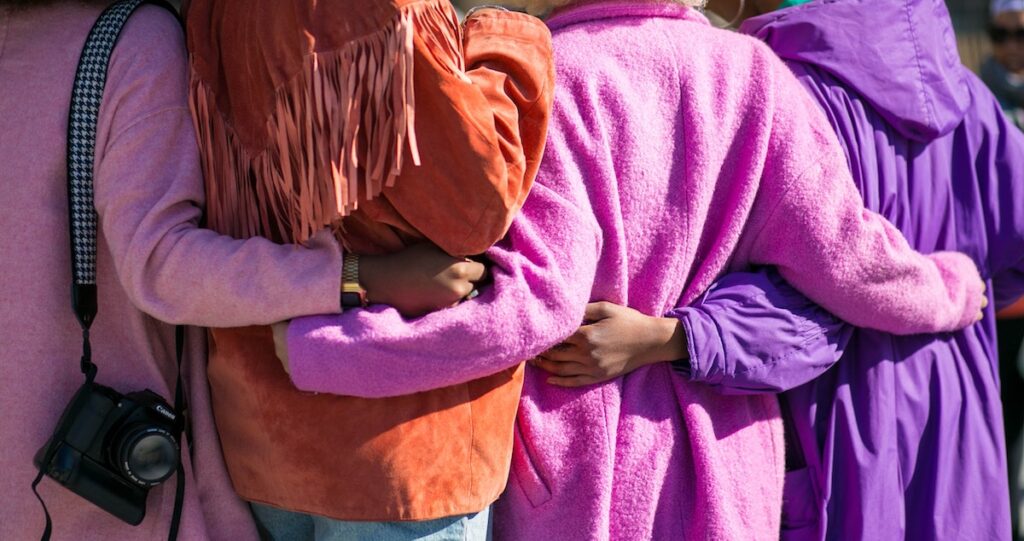
How to Become a Clinical Social Worker: Your Complete Guide
Among the allures of clinical social work? The high volume [...]

Group social work arose as a practice in the early 20th century, more or less concurrently with group psychotherapy. What distinguished group social work was its focus on “social reform, social responsibility, democratic ideals, and social action.” In other words, its targets were as much the community-at-large and social justice as the individual members of the group.
The practice of group social work was officially sanctioned at the 1935 National Conference for Social Work Its stated objective: supporting “the development and social adjustment of an individual through voluntary group association” in order to ‘further other socially desirable ends.” As is so often the case in social work, the community remained in the foreground.
Today’s group work often looks very different from this early version: its current focus is, typically, more on group members than on the community surrounding them, for one. The end goals, however, are the same. In groups, individuals facing common issues can empower one another to work through the kinds of challenges—such as addiction, sexual abuse, cancer diagnoses, and parenting problems—that are the most likely to leave people feeling isolated and powerless. The value of group work is about more than commiseration. When they help others, members of support groups learn how to help themselves.
Group social workers have one of the most sought-after jobs in mezzo-level social work—possibly because their role allows them to help many people at once. These social workers do more than just open up meetings and ask questions to keep people talking. They are facilitators and guides in a journey toward self-discovery and greater contentment.
In this guide to how to become a group social worker, we’ll cover:
Group social workers typically oversee small groups of people who come together to talk through and work on shared issues. For instance, a group social worker might run:
Their responsibilities include:
Some group social workers work at the micro level, overseeing family groups. The dynamic in these groups can be very different, but the overall goals of micro-level group work are the same. In both settings, social workers are expected to evaluate the effectiveness of the groups they oversee and any programs associated with those groups.
When you become a group social worker, you might work part-time or full-time for a:
The individuals in your groups usually attend by choice, but in some cases, one or more group members may be there because the state, the courts, a doctor, or a family member compelled them to attend. Your groups may be task-oriented (focused on helping people meet specific personal or professional goals), support-oriented (focused on growth and development), or psychotherapy-oriented (focused on relieving psychological issues).
Your day-to-day duties will vary depending on where you work and the needs of the population you serve. In general, you will probably be responsible for the following responsibilities:
The best part about becoming a group social worker may just be that every day is so different. You may work with the same people over an extended period, but in that time, you’ll be exposed to many perspectives you might not have encountered on your own.
| University and Program Name | Learn More |
|
Virginia Commonwealth University:
Online Master of Social Work
|
There are different types of group social workers, so mezzo-level social workers need to choose a specialty area. Some examples of specialty areas you might choose are:
If you decide to work with people struggling with a substance abuse disorder, your group work will revolve around helping people understand that they’re not alone in what they’re going through. You will present them with strategies for beating drug addiction, alcohol addiction, gambling addiction, and sex addiction.
Group social workers who specialize in mental health, on the other hand, run groups for people who are working through emotional and psychological issues and may need a safe space to explore what is going on in their heads and hearts.
Marriage and family social workers may spend most of their time working with individuals, but can sometimes be called upon to don the mantle of group social worker (when many people are affected by a death, traumatic event, substance abuse, sexual abuse, or child abuse).
Regardless of your specialty area, part of your job will be to make sure the group meeting is a judgment-free zone where people can share their problems, successes, and slip-ups freely. To excel in this career, you need to be very comfortable dealing with groups and very good at de-escalation. A supportive group dynamic involves give-and-take, and it is up to you to make sure there is that necessary balance.
Some traits and talents successful group social workers share are:
Social work is a field that asks a lot of people, whether practitioners work with individuals or in a group setting. It’s draining to spend most of your time helping the traumatized, the oppressed, the ill, and the addicted, knowing that there will always be more people who are hurting and many whom you won’t be able to reach. You will be a more effective group social worker and derive more meaning from your career if you can create your own support systems outside of work.
The first step toward becoming a group social worker is earning a bachelor’s degree. Most social workers either choose a degree relevant to the job (such as a bachelor’s degree in counseling, sociology, or psychology) or a Bachelor of Social Work (BSW). It typically takes four years of full-time study to earn this degree, though students attending part-time online programs like those offered by Troy University and the University of North Dakota may take five to seven years to graduate. If you want to finish faster, there are accelerated programs. University of Alabama, for instance, has a BSW program that can be completed in as little as two years.
Core courses in BSW programs include:
Most Bachelor of Social Work programs are focused on micro-level social work and require students to complete a supervised clinical social work internship to graduate. If you think you might like to specialize in a specific area of social work (e.g., military, hospice, children and families), look into internships in those areas.
After you complete your BSW (or another appropriate undergraduate degree), your next step will be to enroll in a Master of Social Work (MSW) program accredited by the Council on Social Work Education (CSWE). You must have a master’s degree to become a group social worker, as group social work is considered clinical practice.
Most MSW programs provide advanced training in micro- and macro-level social work. Relatively few are focused on mezzo-level social work, so your best bet is probably to enroll in an advanced generalist master’s degree program that offers concentrations (sometimes called clinical practice majors or sub-specializations) relevant to your career aspirations. If that’s not possible, seek a program that provides opportunities to take electives related to a wide range of clinical specialties.
The population or populations you want to work with will drive your choice when you’re searching for the best MSW programs. Some MSW concentrations to consider:
Your circumstances can also help you choose. Most on-campus MSW programs, like those at the University of Michigan and the University of Chicago, take two years to complete. There are also accelerated MSW programs (like the 18-month programs at Fordham University and the University of Denver) and advanced standing programs (like those at Boston University and the University at Buffalo (SUNY)) that allow qualified students to skip general coursework and finish in less time. If you can’t handle a full course load, however, there are also part-time MSW programs. These typically take three years or more to complete.
The MSW is often a terminal degree in this field. It’s not necessary to earn a PhD in social work or a Doctorate of Social Work (DSW) degree to become a group social worker. However, if you think you might like to transition into macro-level social work someday, it’s worth looking into these programs.
To become a group social worker, you’ll need to have the licenses and certifications that all clinical social workers are required to hold. Specific license and certification requirements for social workers differ by state, though most bachelor’s degree and master’s degree programs include elements (like fieldwork) that satisfy licensing requirements. Most states require social workers to participate in continuing education courses to maintain their social work licensure. Prepare to become a lifelong learner if you pursue this career.
Before you can become a group social worker, you’ll need to become a Licensed Baccalaureate Social Worker certification (abbreviated as LBSW, CSW, or LSW) by passing the Association of Social Work Board’s (ASWB) Bachelor’s Exam. This will qualify you for entry-level jobs in social work that do not involve providing clinical services to clients.
Once you’ve earned your MSW, you can become a Licensed Master of Social Work (usually abbreviated as LMSW, LGSW, or LSW) by passing the ASWB’s Master’s Exam. In some states, this is the highest level of licensure for clinical social workers. In others, social workers can become a Licensed Master Social Worker-Advanced Generalist (known as an LMSW-AP, LMSW-AG, LISW, or LMSW-M) or become a Licensed Clinical Social Worker (abbreviated as LCSW, LICSW, or LMSW-C).
From there, you can pursue any certifications related to your specialty. You might, for instance, get your Certified Children, Youth and Family Social Worker credential or Clinical Social Worker in Gerontology credential from the National Association of Social Workers (NASW). The NASW offers 18 social worker certifications in nine practice areas.
That depends on your career ambitions. The stereotype of the starving social worker isn’t entirely accurate, but chances are you won’t get rich as a group social worker. The US Bureau of Labor Statistics doesn’t track pay rates for group social workers specifically, but the average pay for all social workers is less than $50,000 per year. The good news is that if you decide to make a career out of group work, you’ll make more than many of your colleagues. According to the Economic Research Institute, the average group social worker salary is about $61,000, which is relatively high for this field.
If you’re more interested in making people’s lives better than in money, then social work really does pay. You’ll see the impact you’re having on the individuals in your groups at every meeting—and you will probably be able to help a lot more people as a group social worker than you could as a clinician working with one person at a time. However, the trade-off is that you will need to check your ego at the door. As a micro-level clinician, you can pat yourself on the back every time one of your clients is successful. When you’re a mezzo-level group social worker, it’s not so black and white.
As Renee R. Zandee-Adams, MSW, LCSW, put it in The New Social Worker Magazine, “I now know that I can not take credit for a successful group, nor should I assume full responsibility for a less than successful one. It is all part of the process of learning together.”
(Last Updated on February 26, 2024)
Questions or feedback? Email editor@noodle.com

Among the allures of clinical social work? The high volume [...]
Categorized as: Social Work, Social Work & Counseling & Psychology